Samsung SSD 840 Pro (256GB) Review
by Anand Lal Shimpi on September 24, 2012 7:00 AM EST- Posted in
- Storage
- SSDs
- Samsung
- Samsung SSD 840
Random Read/Write Speed
The four corners of SSD performance are as follows: random read, random write, sequential read and sequential write speed. Random accesses are generally small in size, while sequential accesses tend to be larger and thus we have the four Iometer tests we use in all of our reviews.
Our first test writes 4KB in a completely random pattern over an 8GB space of the drive to simulate the sort of random access that you'd see on an OS drive (even this is more stressful than a normal desktop user would see). I perform three concurrent IOs and run the test for 3 minutes. The results reported are in average MB/s over the entire time. We use both standard pseudo randomly generated data for each write as well as fully random data to show you both the maximum and minimum performance offered by SandForce based drives in these tests. The average performance of SF drives will likely be somewhere in between the two values for each drive you see in the graphs. For an understanding of why this matters, read our original SandForce article.
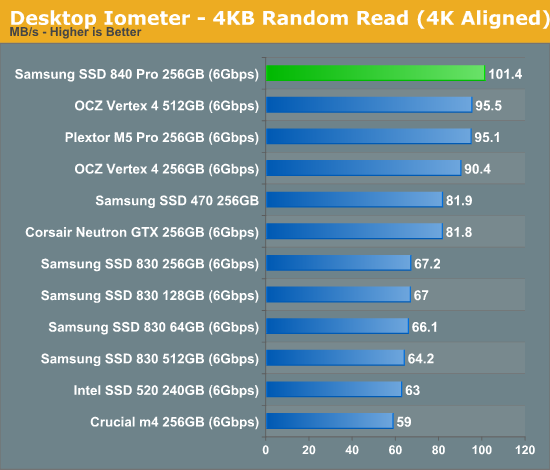
We have a new king, the 840 Pro manages to inch past the fastest Vertex 4 in our random read performance test.
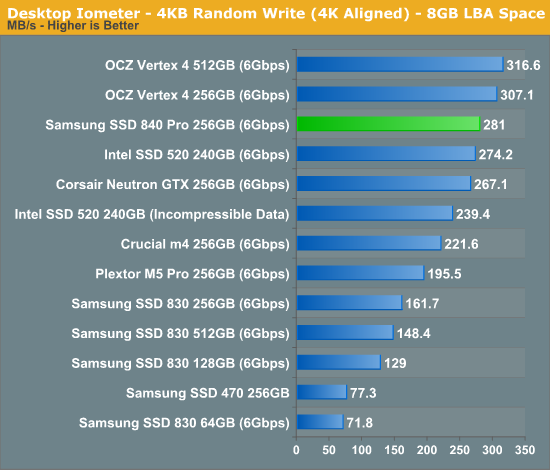
The low queue depth random write performance crown goes back to the Vertex 4, but the 840 Pro is around 75% faster than the old 830. Other than the Vertex 4, there's nothing faster than the 840 Pro here.
Many of you have asked for random write performance at higher queue depths. What I have below is our 4KB random write test performed at a queue depth of 32 instead of 3. While the vast majority of desktop usage models experience queue depths of 0 - 5, higher depths are possible in heavy I/O (and multi-user) workloads:
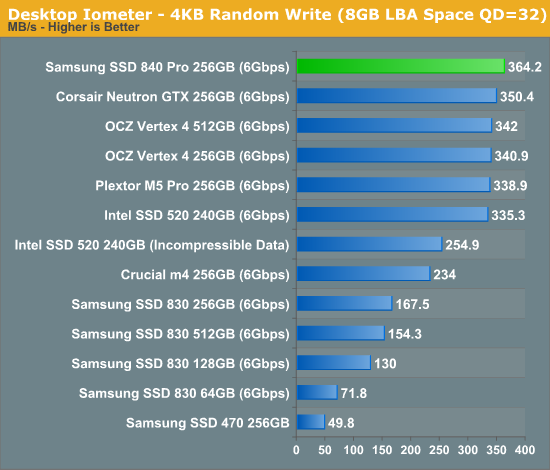
Ramp up queue depth and the 840 Pro manages to even outperform Corsair's new Neutron GTX.
Sequential Read/Write Speed
To measure sequential performance I ran a 1 minute long 128KB sequential test over the entire span of the drive at a queue depth of 1. The results reported are in average MB/s over the entire test length.
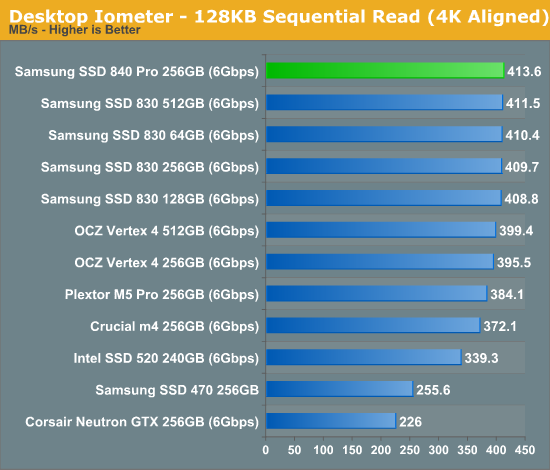
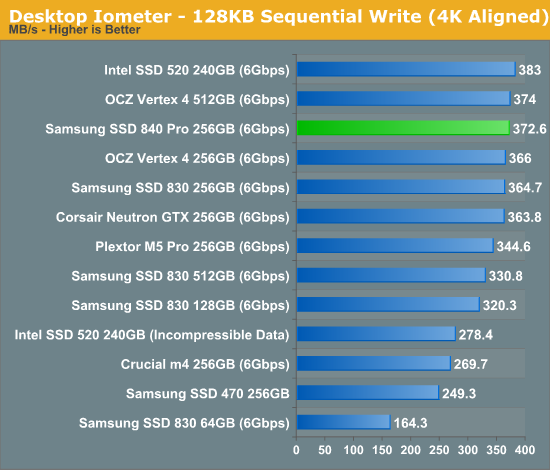
There are no tradeoffs here: excellent random IO performance and class leading low queue depth sequential performance. The 840 Pro is looking like a good all-around performer.
AS-SSD Incompressible Sequential Performance
The AS-SSD sequential benchmark uses incompressible data for all of its transfers. The result is a pretty big reduction in sequential write speed on SandForce based controllers.
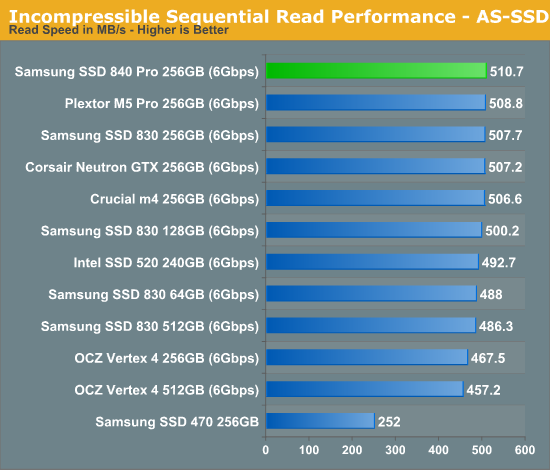
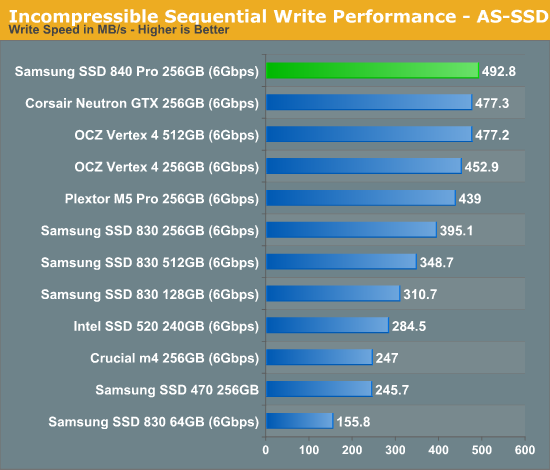
The 840 Pro lands on top once again in these higher queue depth sequential tests. The competition is hot on the heels of the 840 Pro however, we're limited by 6Gbps SATA here so expect continued clustering around 500MB/s going forward.










96 Comments
View All Comments
Kristian Vättö - Wednesday, September 26, 2012 - link
We managed to run all of our normal tests (i.e. the stuff needed for this review) and Anand was simply running some enterprise tests to see how the 840 Pro behaves there. This is quite normal testing for us, so it's not like we were trying to break the drive on purpose.A new drive is already on its way to Anand, plus I have the regular 840.
Benny_k80 - Friday, November 16, 2012 - link
What happened to the information about the defect drives? Did Samsung have any explanation?hasseb64 - Thursday, September 27, 2012 - link
Why the big differens between claimed and tested power consumption?Roughly 3 watts is very high in a ultrabook, are there any sub 1 watt SDD left out there?
Per Hansson - Friday, September 28, 2012 - link
hasseb64: look at the previous comments regarding DIPM & EIST.There might be some problems with the testing performed, lack of DIPM can have a huge power consumption difference...
The sampling interval of the device they use to measure power consumption is also very important since SSD's switch power states very very frequently...
GullLars - Friday, September 28, 2012 - link
I just have to say, this drive impressed me. If the stability is the same as 830 Samsung has a real winner here.One of the things i note here is something i've noticed the lack of in other SSDs earlier, and been vocal about. Since the SSDs have large DRAM buffers, they should easily be able to use it as a read-ahead for small block sequential and low QD sequential reads. Going by the iometer 128KB seq read and ATTO graphs, i'd say this is exactly what samsung has done.
It also seems they have implemented a decent sized write buffer to do the same for writes. Let's hope it's implemented safely so you don't loose or corrupt data on powerloss.
I've been recommending 830 lately, and if early reports (after the first month) indicate 840 pro is stable, it will be the my recommendation if the prices are decent.
With the maxing of SATA 6Gbps getting close (or is already here?), it's now time for SATA Express or just native PCIe SSDs.
thefizzle656 - Monday, October 1, 2012 - link
Hey Kristian between the 840 Pro and the M5 Pro which would you choose? It would be going into a 2011 MBP for both OS X and Boot Camp. I'm looking to get a 512 GB drive and it looks like the M5 Pro is going to coming in at less than $450, so my thought is to get the drive that is the cheapest. Please let me know. Thanks.chrcoluk - Friday, October 12, 2012 - link
Whilst these benchmarks all look pretty sweet, they ultimately dont mean much.In real world usage I expect a 840 PRO wont feel any faster than my 830 at all, and the fact they sweep aside a quickly driving drive as not relevant is a worry.
Whilst performance is important, reliability is something I value higher. Also value for money shouldnt be ignored either, so in my opinion the best thing about this drive is it is making the 830 cheaper.
Also the non pro 840 uses TLC which I suspect reduces life expectancy and increases CRC error rates, I would avoid the normal 840 completely whilst MLC drives are still on the market.
So thanks for the review and thanks for the price drops samsung so now I can buy another 830 this time for my laptop :).
dgigibao - Wednesday, October 17, 2012 - link
Several times you recommend the Samsung 830 for Mac OSX users for the same kind of controller whitch Apple in puts in their factory SSD. Whould would recommend 840 Pro for Mac OSX users to?Benny_k80 - Tuesday, November 13, 2012 - link
What happened to the information about the defect drives? Did Samsung have any explanation?FCss - Wednesday, November 14, 2012 - link
I was about to buy this SSD today and just went through the article again and saw the update about the second drive dying. I hope it's not a design flaw.